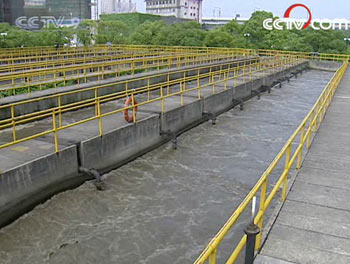Olympians face tough opponent: pollution
Daily updated Environmental news related to China
| By Shirong Chen
BBC News |
 Air quality is a major concern for organisers of the Olympics |
Starting this weekend, a new standard for car emissions will come into force in Beijing.
Some areas surrounding the capital have also joined in efforts to help reduce air pollution.
China has pledged Beijing's air quality will be up to the standard laid down by the World Health Organisation during the Games in August.
However, the air is still too dirty. One of the four indicators - the density of breathable particles in the air - is still too high.
To cut pollution, a new standard for car emissions will be enforced from 1 March, falling in line with the latest European Union standard.
A new type of less-polluting petrol will be available too.
Cars and buses that fail the checks will be banned from the streets.
More than 1,300 petrol stations in Beijing are being upgraded to cut fumes and the rest will be shut down.
In addition, the Chinese authorities have ordered five provinces around Beijing to join the efforts and reduce industrial activity for two months before the Games.
The measures cover the neighbouring city of Tianjin, Shandong province to the east, and the vast region of Inner Mongolia to the west.
From July both Beijing and Tianjin will restrict private car use, allowing only odd or even registration numbers to go out on any given day.
China hopes such drastic measures can reassure foreign delegations that there will be no heavy pollution to harm their athletes.
WATCH VIDEO
The national environment watchdog says it's introducing a green insurance system to improve monitoring of polluting industries and help victims get immediate compensation. This latest initiative follows the Green Credit Measure adopted last summer.
 |
| Rapid economic development has also created a high incidence of environmental pollution accidents. Last year, over 100 environmental emergencies were reported. |
The system aims to have all industries with pollution risks insured with insurance companies. According to the State Environmental Protection Administration, the system will be implemented nationwide by 2015 after a trial period.
Bie Tao, deputy director of Policies & regulations Dept, SEPA, said,"The higher the risk of causing serious pollution, the more money an enterprise needs to pay for the insurance. The premium could bankrupt an enterprise."
The system will be tried out this year in companies that produce, sell, store, transport or use high-risk chemical products, the petrochemical industry and dangerous waste disposal enterprises that are prone to serious pollution accidents. Enterprises and industries that have caused serious pollution accidents in recent years will be especially targeted.
At the moment, if a serious environmental incident happens, the company responsible usually resorts to bankruptcy to avoid paying the huge amount of compensation and pollution control expenses.
Bie Tao said, "There's no mechanism to ensure that enterprise fulfill their responsibility to compensate victims and restore the environment after an incident. This situation where enterprises make profits and society pays the cost of cleaning up will not continue."
Rapid economic development has also created a high incidence of environmental pollution accidents. Last year, over 100 environmental emergencies were reported.
SEPA's figures show that over eighty percent of the country's 7,500 big chemical projects are in densely-populated areas or next to rivers.